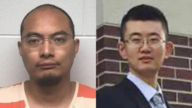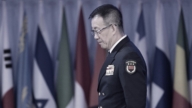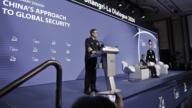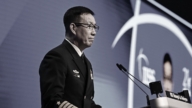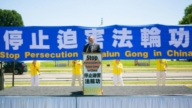【新唐人2011年7月18日訊】自江澤民病危及病死的消息傳出以來,如何給江澤民蓋棺定論,已成為中共當局極具爭議和頭痛的事情,甚至由此引發政治鬥爭。江澤民的生平劣跡,也引起海內外各界的關注。本臺對江澤民的惡行醜事做出系列報導,今天的話題是江澤民「腐軍弄權」。
江澤民踏著「六四」的鮮血登上總書記之位後,1991年蘇聯和東歐共產黨解體。投靠陳雲、李先念等左派元老的江澤民,高舉「反和平演變」的大旗,推行極左路線,反對改革。
1992年初,鄧小平由國家主席楊尚昆陪同南巡,直接點了江澤民的名,說「誰不改革誰下臺」。而江卻指令中宣部對鄧南巡的報導要「統一口徑」。隨後,江在政治局擴大會議上,傳達鄧的南巡講話,刪去了其中大量內容。
92年3月人大會議上,軍方總政治部主任楊白冰率先喊出:「為改革開放保駕護航」。《深圳特區報》率先披露了鄧小平南巡及發表重要講話。
江澤民受到來自楊氏兄弟、喬石、萬里、田紀雲等人的強大壓力,而左派元老李先念6月病死。曾慶紅分析,鄧小平有可能用喬石代替江澤民做總書記,江被迫不得不支持改革。
鄧小平怕改革路線被拋棄,更怕死後「六四」被平反﹔而楊尚昆開始就不願意用軍隊鎮壓學生。於是,江澤民、曾慶紅離間鄧楊之間的關係,借鄧之手解除了「楊家將」的軍權,江後來害死了楊尚昆。
1995年初,北京市長陳希同聯合7個省委,給鄧小平寫聯名信,舉報江澤民父親是漢奸的秘密。而鄧卻把信交給了曾極力推薦江的薄一波處理。
江為此跪求薄一波。鄧在薄的勸說下,放了江澤民一馬。而薄一波則要江為他的兒子薄熙來加官晉爵。中共八元老之一的薄一波是整人能手,後來多次為江出謀劃策迫害「法輪功」。
97年鄧小平病逝。江澤民借北京副市長王寶森自殺事件,將陳希同以貪污受賄等罪判刑16年。江又借「遠華走私案」,整治了鄧為江安排保駕的軍委副主席劉華清。
江為保權位,在軍隊中大肆培植親信,97年一年內就提撥了各級將軍530名,軍委副主席張萬年、郭伯雄、總政治部主任於永波等人,成了江的鐵桿心腹。
江當上軍委主席後,放縱軍隊大肆經商,軍隊出現了前所未有的腐敗,比地方腐敗更嚴重,軍隊走私物品無所不有,甚至包括毒品。
伍凡(《中國事務》主編):「他把那些老軍頭一個個都趕走,提撥他的人,就是用腐敗、女色、金錢來收買這些高級將領,為他服務,這個軍隊變成是黨軍、變成是江澤民的家軍。」
98年朱鎔基總理講:近年來每年走私8千億,軍方是大戶,至少5千億。光98年上半年軍隊開槍、開炮打死海關緝私公安武警450人,打傷2200多人。他們還冒用總理簽字,隨便蓋上軍委副主席大印就冒領20億,事情到江那裏就被壓下了。
98年國防部長遲浩田講:每年軍費有50%以上花在高中級幹部吃喝、出國旅遊、豪華轎車住宅上。加上走私和經商,軍中幹部98年實際揮霍相當於當年軍費940億的7倍以上。
2002年上半年,中共中央政治局通過了關於「江全退」的決議。而江澤民10月出訪美國後,在十六大上,江策劃授意張萬年等人搞軍事政變,江成功的留任軍委主席。
2003年初,政治局召開組織生活會,李瑞環等人對江提出了六個方面近40條意見,其中包括:專權、搞獨裁、個人崇拜、樹碑立傳、到處作秀、嚴重損害中國的國際形象等等。
2004年8月26號,39軍的3百多名老軍人衝進中南海,舉著花圈說是獻給江澤民,要求江下臺。洪學智、劉華清、楊白冰等老將軍提出,「江全退」的時候到了。
9月1號,江給政治局寫信假意「請辭」軍委主席,同時策動親信「挽留」他。不料,在13號的政治局擴大會議上,被江提拔的軍委委員徐才厚、梁光烈、李繼耐等人紛紛表態,支持江的「請辭」。
江的攝政曾慶紅一看風頭不對,也贊成江下臺。江被迫在十六屆四中全會上交出了軍委主席的職務。但是,江在黨政軍中仍有相當大的影響力。
伍凡:「一個最典型例子,四川汶川地震的時候,溫家寶想調軍隊(救災)調不動,他們一定要聽不是軍委主席的江澤民、要聽他的命令,連胡錦濤軍委主席也調不動,所以這個軍隊完全變成一個私人軍隊了。」
在2007年十七大上,江澤民、曾慶紅再次將多名親信塞進了政治局常委會,把胡錦濤選定的接班人李克強擠了下來,並試圖左右2012年十八大的人事佈局。
2009年4月,喬石、李瑞環罕見的突然發聲,支持由胡溫主導十八大人事佈局。此後,江派、太子黨、胡溫團派,就薄熙來「唱紅打黑」、習近平進入軍委等,展開了一系列的權力鬥爭較量。
自2010年起,江澤民開始失勢,再也沒有在黨報和官方活動中露過面。胡錦濤開始主導軍方人事佈局。今年7月,海外媒體相繼傳出江病危及病死的消息,江系人馬紛紛尋找後路,江澤民正式走向退出政治舞臺。
新唐人記者常春、李元翰周天採訪報導。
Truth of Jiang Zemin: Part VI
Jiang Zemin’s death or illness has led to a dispute in
the Chinese Communist Party (CCP) regarding Jiang’s life.
Jiang’s notorious deeds have attracted wide attention.
NTD is making a series of reports on Jiang’s life.
Today’s topic is Jiang’s politicking within
the Chinese Communist Party’s (CCP) corrupt army.
Due to his role in Tiananmen Massacre in 1989,
Jiang Zemin became the CCP’s General Secretary.
In 1991, the former Soviet Union and the Communist Eastern Bloc disintegrated.
Under the protection of CCP leftist veterans Chen Yun and Li Xiannian,
Jiang Zemin was advocating the ultra-left line and against reforms.
In early 1992, Deng Xiaoping was accompanied
by the CCP’s then-President Yang Shangkun on his southern tour.
Deng specifically mentioned Jiang’s name and
said “the one who does not reform will step down.
" Meanwhile, Jiang ordered the Central Propaganda Department
to unify their statements regarding Deng’s southern tour.
Subsequently, on an expanded meeting of the Politburo,
when conveying Deng’s speeches made on his southern tour,
Jiang deleted a large amount of contents.
On National People’s Congress held in March 1992,
the CCP’s military General Political Department Director Yang Baibing
shouted: “To defend the reform and opening up."
Shenzhen Special Zone Daily was the first to disclose Deng’s southern tour speeches.
Jiang was under a lot of pressure from many CCP veterans,
including Yang Shangkun, Qiao Shi, Wan Li and Tian Jiyun.
In June 1992, Jiang’s backer, left-wing elder Li Xiannian died.
Jiang’s subordinate Zeng Qinghong analyzed that
Deng could be planning to appoint Qiao Shi to be the next CCP General Secretary, instead of Jiang.
To secure his position, Jiang was compelled to support the reform.
Deng feared that his reform would be abandoned.
He feared more of the vindication of Tiananmen Movement.
Yang was reluctant at the beginning of the crackdown to use troops to suppress the students.
So, Jiang and Zeng Qinghong set Deng at loggerheads with Yang.
Jiang used Deng to take away Yang’s military power.
Eventually, Jiang murdered Yang Shangkun.
In early 1995, Beijing’s Mayor Chen Xitong and
seven other provincial CCP committee leaders wrote a joint letter to Deng,
exposing that Jiang’s father was a traitor to China.
Deng told Bo Yibo to handle the matter.
One of the CCP’s Eight Elders, Bo highly recommended Jiang in the past.
Jiang begged Bo on his knees. Bo later persuaded Deng to forgive Jiang.
In exchange, Bo Yibo asked from Jiang high-ranking positions for his son, Bo Xilai.
Bo Yibo was an expert in abusing people.
He later gave Jiang lots of advice on how to persecute Falun Gong practitioners.
Deng died in 1997. Using the suicide of Beijing’s deputy mayor Wang Baosen,
Jiang sentenced Chen Xitong to 16 years in prison for bribery and corruption.
Jiang also used “Yuanhua Smuggling Case" to force
Central Military Commission (CMC) Vice Chair Liu Huaqing to resign.
Liu was previously arranged by Deng to assist Jiang in the army.
To protect his position, Jiang wantonly planted his cronies in the military.
In 1997 alone, he promoted 530 generals.
CMC’s Vice Chair Zhang Wannian, as well as Guo Boxiong and
General Political Department Director Yu Yongbo all became Jiang’s confidants.
After becoming the CMC chair, Jiang allowed the army to indulge in running businesses.
There was an unprecedented corruption in the military.
It even surpassed the corruption of local governments.
The armed forces smuggled all kinds of goods, including narcotics.
Wu Fan (China Affairs Editor-in-Chief): “He (Jiang) drove away all the veteran military officials.
He promoted and bought hundreds of high-ranking military officials with women and money.
The Chinese army was turned into the CCP’s army and Jiang’s own private army.”
In 1998, the then-Premier Zhu Rongji said,
in recent years, goods worth RMB 800 billion were smuggled annually.
The military alone accounted for at least RMB 500 billion.
In the first half of 1998 alone,
the military smugglers opened fire and killed 450 anti-smuggling police officials and injured 2,200 more.
The military even forged the Premier’s signature and embezzled RMB 2 billion.
All investigations regarding such cases were smothered by Jiang.
In 1998, defense minister Chi Haotian said,
over 50% of the annual military expenditure was incurred by high-ranking cadres on banquets,
overseas travels and luxury houses and cars.
With the income from smuggling and conducting businesses,
in 1998, the actual military cadres squandered 7 times of the RMB 94 billion military expenditure.
In 2002, the CCP’s Central Committee Politburo passed a resolution to let “Jiang step down."
On the CCP’s 16th National Congress in Nov 2002,
Jiang ordered Zhang Wannian to stage a military coup.
As a result, Jiang successfully remained the Chair of Central Military Commission.
In early 2003, the Politburo organized a session of criticizing and self-criticizing.
Members of the Politburo, including Li Ruihuan, made nearly 40 negative comments about Jiang.
They included exclusive privileges, authoritarian rule, personal cult,
personal glorification and seriously damaging China’s international image.
On Aug. 26, 2004, over 300 veteran soldiers burst into Zhongnanhai,
holding a wreath dedicated to Jiang.
They demanded Jiang to step down.
Old generals, including Hong Xuezhi, Liu Huaqing and Yang Baibing, proposed that Jiang should retire entirely.
On Sep. 1, 2004, Jiang wrote to the Politburo, pretending to resign.
Meanwhile, he instigated his cronies to “retain" him.
Unexpectedly, on a Politburo meeting held on Sep. 13, many CMC members,
who were promoted by Jiang, supported Jiang’s “resignation.”
Sensing a change of political climate, Jiang’s “regent” Zeng Qinghong also supported Jiang’s resignation.
Jiang was forced to resign later.
However, he still had considerable influence on the military and politics.
Wu Fan: “A typical example is that when Wenchuan earthquake took place in 2008,
CCP’s Premier Wen Jiabao wanted to dispatch the army to help with the relief efforts, but couldn’t do so.
The army only wanted to receive civilian Jiang Zemin’s orders.
Even the chair of CMC, Hu Jintao, couldn’t dispatch the army.
The army had been turned into Jiang’s private army.”
In 2007 CCP’s National Congress, Jiang and Zeng Qinghong promoted many of their cronies into the Politburo Standing Committee.
Hu Jintao’s chosen successor Li Keqiang was squeezed out.
Jiang and Zeng tried to manipulate the personnel arrangement for the 2012 National Congress.
In April 2009, the usually silent Qiao Shi and Li Ruihuan suddenly supported
the personnel arrangement of the Hu-Wen-led 18th National Congress.
Since then, the Jiang’s faction, Crown Prince Party and the Hu-Wen camp had
a series of battles on various issues, such as Bo Xilai’s “red song singing."
Since 2010, Jiang began to lose power.
He was no longer seen in CCP’s newspapers or official activities.
Hu began to dominate the arrangement of military personnel.
In early July, 2011, the foreign media reported Jiang’s death.
Jiang’s followers are looking for a way out for themselves.
Jiang formally withdrew from the political arena.
NTD reporters Chang Chun, Li Yuanhan and Zhou tian





